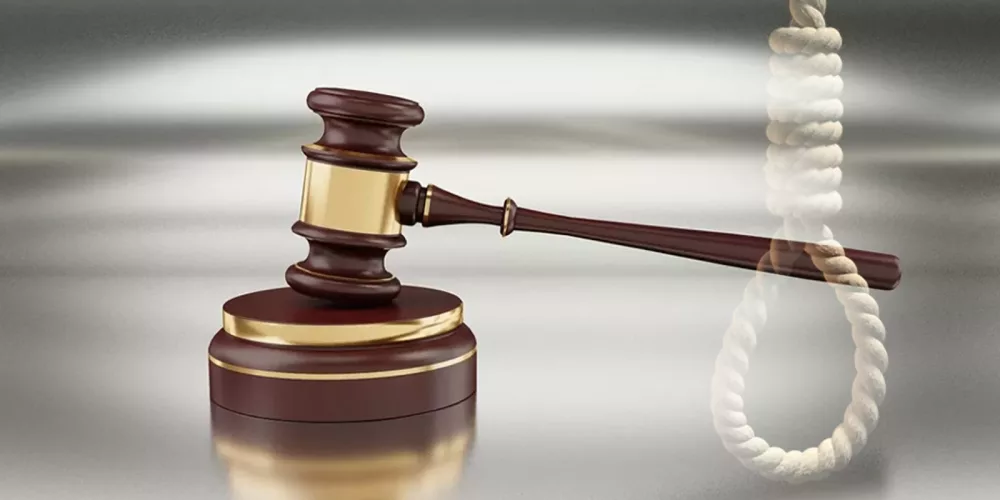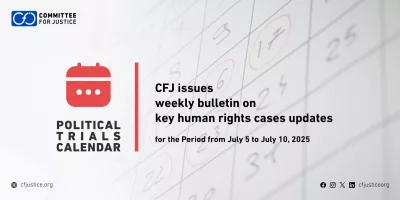The Committee for Justice (CFJ) stated that the increasing number of executions in Egypt on politically motivated charges constitutes a blatant violation of fundamental human rights, foremost among them the right to life. It pointed out that these sentences are often issued following trials that lack standards of justice and fairness and, in many cases, rely on confessions extracted under torture, with the absence of adequate defense guarantees.
In this context, the First Circuit of the Criminal Court, convened at the Badr Court Complex, issued its ruling in Case No. 5314 of 2023 (Al-Hadayeq), registered as Case No. 41 of 2023 under State Security Crimes, known in the media as the “Revolutionary Core Cell” case. The court sentenced the following individuals to death by hanging:
– Mahmoud Mohamed Fathy Badr (fugitive)
– Ahmed Hesham Badr Abdo Khodr (fugitive)
Additionally, the court sentenced four other defendants to life imprisonment:
– Mahmoud Afraj Ahmed Abu Shenb (in custody)
– Mahmoud Fouad Mohamed Badada (in custody)
– Ayman Mostafa Ahmed Mohamed Abbas (in custody)
– Mabrouk Mohamed Mohamed Ajeen, also known as Gaber Abu Ajeen (in custody)
Furthermore, the court ordered that the life-sentenced individuals undergo five years of ideological rehabilitation programs after serving their sentences and imposed legal fees and the confiscation of case-related evidence. The court also classified the convicted individuals—along with their affiliated entity, the Revolutionary Armed Groups of the Muslim Brotherhood—under Egypt’s list of terrorist entities and individuals. Additionally, they were placed under five years of police supervision following their release.
CFJ asserts that these rulings are primarily based on security reports prepared by National Security officers without any tangible material evidence supporting these allegations. The Egyptian Court of Cassation has previously ruled in multiple cases that intelligence reports alone are insufficient as the sole basis for judicial rulings. This makes the “Revolutionary Core Cell” case another example of trials that fail to meet international justice standards. Sentencing individuals under such conditions effectively amounts to arbitrary executions, which violate fundamental principles of international human rights law.
Egypt has faced repeated criticism from various international bodies for the escalating use of capital punishment, particularly in politically charged cases. In 2018, the United Nations High Commissioner for Human Rights, Michelle Bachelet, warned against the execution of 72 individuals convicted in the Rabaa Sit-in Dispersal case, describing these sentences as “a miscarriage of justice” that cannot be undone, highlighting the lack of minimum fair trial guarantees.
In a UN memorandum issued in September 2021, UN experts expressed concern over the surge in executions in Egypt, stressing that Egyptian courts have failed to meet international fair trial standards. They further asserted that carrying out death sentences following unfair trials constitutes a serious violation of the right to life and may amount to crimes against humanity.
Egypt’s counterterrorism laws have also faced widespread criticism. The UN Special Rapporteur on Counterterrorism, Fionnuala Ní Aoláin, stated that these laws contain broad and vague provisions that enable the suppression of political opposition, criminalization of free expression, and expansion of arbitrary detentions, leading to a continuous deterioration of human rights in the country.
Given these grave concerns, CFJ urges Egyptian authorities to immediately suspend the execution of death sentences in this and other similar cases, considering this an essential step toward reforming Egypt’s criminal justice system.
The committee also calls for a fair retrial for the defendants before a regular, impartial court—not exceptional courts—where they are granted full legal guarantees, including the right to present a defense and have their case handled with impartiality and independence.
Furthermore, CFJ stresses the need to review and amend Egypt’s counterterrorism laws, which currently suffer from ambiguities and broad interpretations that allow for arbitrary enforcement, leading to severe human rights violations. These laws should be aligned with international human rights standards to prevent their use as a political tool against dissenters.
Finally, CFJ calls on the international community to intensify pressure on Egyptian authorities to halt politically motivated executions and ensure compliance with international human rights standards. The committee also emphasizes the need for justice and remedies for the families of those executed after trials lacking the minimum standards of fairness.






